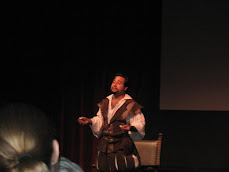
Alexandros
by Melinda Lopez, directed by David Ellenstein World Premiere
Laguna Playhouse • June 6-July 20, 2008 (Opened 6/6, rev’d 6/7)
WITH Saundra Santiago, Katharine Luckinbill, Maria Cellario, Chaz Mena, Kevin Symons PRODUCTION Marty Burnett, set; Julie Keen, costumes; Paulie Jenkins, lights; David Edwards, sound; Rebecca Michelle Green/Jennifer Ellen Butler, stage management. Commissioned by Laguna Playhouse
It takes some time to determine where Melinda Lopez is going in ‘Alexandros,’ the second of her Cuba-America bridge plays to play at the commissioning Laguna Playhouse (through June 29). Unfortunately, once we’re at our destination, even with a ‘come out, come out’ subplot that’s easier said in 2008 than done in the play’s Watergate-era setting, the package feels dull on arrival. Getting there, clearly intended to be more than half the fun, is an uneven ramble of farce, superficial character study, and stock characters. There’s the forgetful grandma, the extroverted but self-obsessed party-mom, and the quiet piano-student teen who harbors insights capable of unlocking the full potential of her older, inauthentic kin.
Lopez challenges director David Ellenstein to balance the serious messages of living honestly (which we ignore, as the excerpted resignation speech of President Nixon attests, at our peril) and the wacky doings of the oddly constructed characters. He achieves only mixed success. The best realized performance is that of Chaz Meña, vaguely invocative of some Andy Garcia - Ron Silver hybrid (not that weird a description when you consider this Latino has starred as Tevya). Whether he’s running around like a lost Marx brother or sincerely peeking out the closet door, Meña is not only believable but likable.
His scenes with Kevin Symons, who also rises above the material, are always engaging, which begs the question of why it is the men who fare better in a story largely about women by a woman. It may be that she has written them more simply, and objectively. The real women who Lopez has grown up with, and who are inescapably sources for her work, may present more important characteristics to wrestle into the work. The men are more simply drawn, and colored with more empathy.
The story centers around a reunion of sorts for a shrinking family of Cuban émigrés. (The play title is the family dog’s name, and points to the Greek showbiz persona one character adopted to hide his true ethnicity.) There are: Abuela (Maria Cellario), the forgetful grand dame whose memory is a convenience store for plot and playwright; her son, Tio (Meña); her daughter, Maritza (Saundra Santiago); and her granddaughter Marty (Katharine Luckenbill). Marty, named after Radio Marti, will honor her namesake as the play’s voice of freedom. The fifth wheel is Eric (Kevin Symons), the extra-familial and overly familiar gardener, whose only possible landscaping talent is back-hoeing.
Despite the appeal of the clarity given the male lovers’ story, it’s Lopez’ three generations of women who demand our attention. In the center is Maritza. The first question is, can her ten-year absence from her declining mother be excused, when it was only the distance between Texas and Florida separating them? As NASA’s Lisa Nowak proved, if you care enough, you can make that drive in no time.
Probably, because it was necessary for Marty to have become mature enough to make her assessments of the others as a semi-equal without them all being so inside each others’ lives so that there was no need for disclosures and revelations. But, for the plot to work, the logic of this family doesn’t. Not without there being some exculpatory dialogue. That would also be useful to make Maritza more likeable, especially challenging after we’ve come to realize that the only reason she has returned: she’s down to her last $4000 after the wheels have come off her second marriage. Her relationships with husbands, daughter, mother and brother are unclear, and it’s hard to keep sluicing through dialogue to mine greater definition when we have a demented grandma with psychic powers and her cruise entertainer son with the faux-gardener boyfriend making sure we don’t take things too seriously.
All these sins are forgivable if the comedy works. But on a set that often seems too big, with an emotional range in Luckenbill’s pivotal performance that seems too narrow, it mostly does not. Luckenbill needs to find a way to play glum and still invite us in.
One of the funniest bits, when characters communicate through a patio door using sign language to avoid detection, really works, and shows both the comedy and subtext about the silliness of deception. However, given the too-small door they must play through, it may be a directorial flourish that came after design meetings would have allowed Marty Burnett to opt for a wider door that would really let us enjoy it more.
Still, the message is a good one: Don’t hold back your true feelings. Be honest, forthright and don’t worry about what the others in the family are going to think. So, we have written our feelings in kind.





















No comments:
Post a Comment